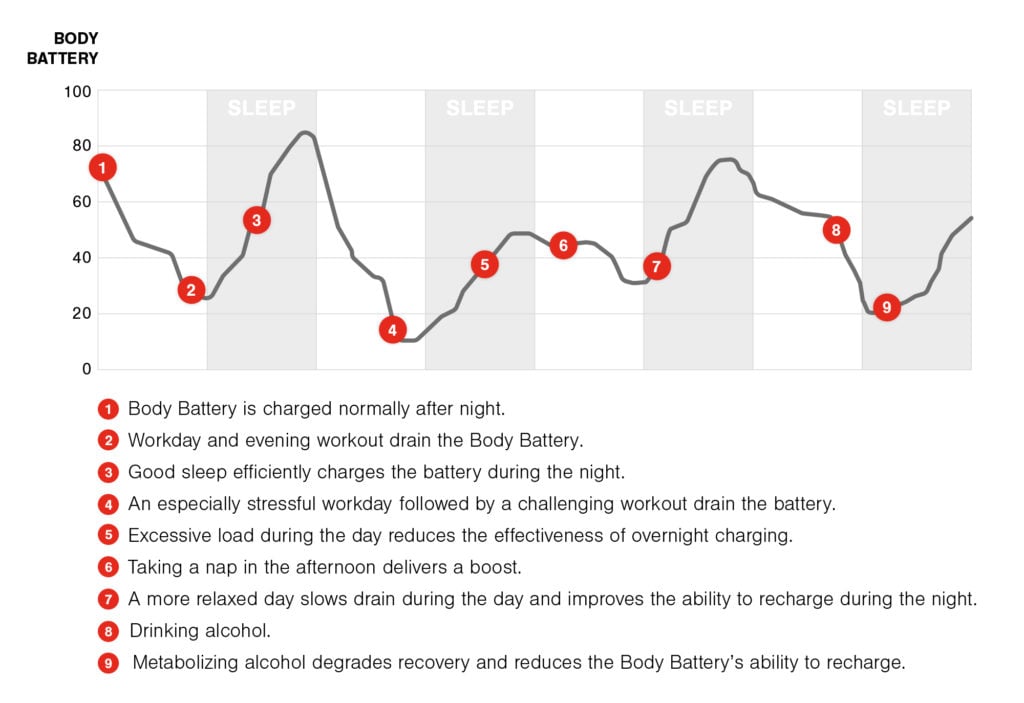
5 Reasons Your Body Battery Says You’re Running Low
By Riikka Lamminen, Content Manager, Firstbeat
The more you use your phone, the faster it runs out of battery. Our bodies work the same way. The more stressful and active your life is, the faster your reserves are depleted.
The Body Battery feature, powered by Firstbeat analytics, helps you keep tabs on how much you have left in your tank. It offers an easy way to connect the dots between stress, recovery, sleep and physical activity. The higher the number (0-100), the greater your ability at that moment to focus, cope and bounce back from challenges.
Sleep and recovering moments replenish your Body Battery, whereas physical activity and stress, be it negative or positive, drain your inner reserves and diminish resiliency.
The science behind Body Battery comes from Firstbeat’s ability to interpret beat-to-beat changes in your heart also known as HRV status, to reveal interplay between the sympathetic (fight-or-flight) and parasympathetic (rest-and-digest) branches of your autonomic nervous system.
By combining the influence of stress, recovery and sleep with the physiological impact of physical activity, Body Battery delivers insight into how your body responds to the challenges of life.
Body is made for use
Your phone is made for use. There is no sense extending the battery life by not using it. The same is true of your body. It is made for use, and both mental and physical strain is good for you – to a certain limit.
A healthy approach to life doesn’t mean keeping your Body Battery full all-day long. It is supposed to diminish during the day.
When your battery is charged up, look for opportunities, activities and tasks that challenge you. Use that energy to get things done with confidence. Rely on the power of good sleep to recharge overnight.
Of course, we all have different responsibilities, jobs and interests, and our mental and physical resources are limited. Body Battery helps you recognize the pressure points, make small changes to optimize your performance and guides your focus toward what matters.

Five Reasons your Body Battery says you’re running on empty
There’s nothing wrong with running your Body Battery down occasionally, especially if you have a clear understanding of why you’re running low. Be aware, however, that if you are frequently in that situation, it might be time to make a few changes to your daily routines and lifestyle choices. Here are five areas worth investigating.
1. Your daily routines are extremely challenging. Overall stress matters. If you have a busy workday, rush to pick up the kids and then crank out a high-intensity workout, your battery will probably be empty before bedtime. It is good to keep in mind that experiences that feel good can also drain your battery. Playing with kids or going to a rock concert are awesome activities, but they might be surprisingly exhausting as well.
2. Inadequate sleep. A good night’s sleep is your best opportunity to recharge your Body Battery to near max capacity. There is a huge difference between 90 or 60 in the morning. It’s noticeable as you go through your day. Improving your bedtime routines and making decisions that promote good sleep can have an enormous impact on your Body Battery.
3. Your fitness can’t keep up with your efforts. The better shape you are in, the more physical and mental stress you can handle. As the defining metric of cardiorespiratory fitness, your VO2 max is the key factor here. If you have a fitness routine you do regularly, a brisk walk may only have a minimal impact on your battery level, whereas when you haven’t done much exercise in a while, it might cause a big drop. So the higher is your VO2 max fitness level, the more vigorous physical activity you can handle without heavy drain on your Body Battery.
The same goes for mental strain. Better cardiorespiratory fitness is associated with better capacity to cope with stress and decreased symptoms of burnout (Gerber et al., 2013). Healthier, more active people also experience less stress during working hours and better night time recovery (Teisala et al., 2014).
So exercise drains your Body Battery temporarily, but regular exercise in the right amounts will bear fruit and extend your battery life in the long run.
4. You drink alcohol. Alcohol is a huge stressor for your body. The stress of metabolizing alcohol drains your Body Battery faster and degrades the restorative quality of sleep, which means slower recharging. One recent study show that even a single drink can have a negative impact on the restorative quality of sleep (Pietilä et al., 2018). Skipping a nightcap is a simple way to improve your ability to recharge during the night.
5. You are unique. There is a degree of individual variation in how our body deals with stress and the types of activities and situations we find strenuous. After a similar workday, one person’s Body Battery might be near the bottom, while another’s is still half full. Similarly, driving a car can be a huge stressor for one person, resulting in a drop in Body Battery levels, but for someone else it might be a relaxing moment that produces a little boost in their levels.
Body Battery provides insight into your own coping abilities, helps put stress and recovery into context, and facilitates better sleep, work and training decisions.






